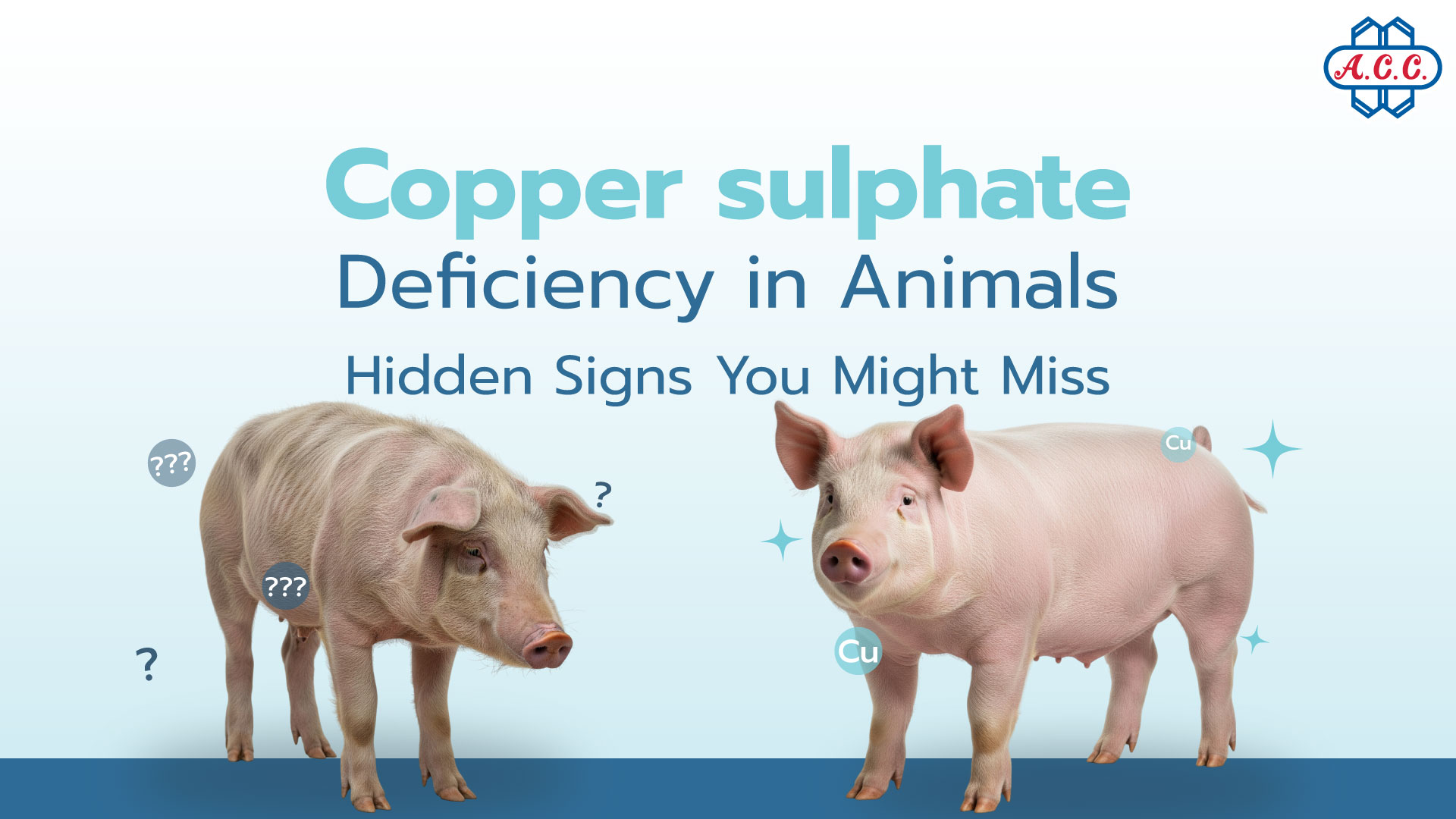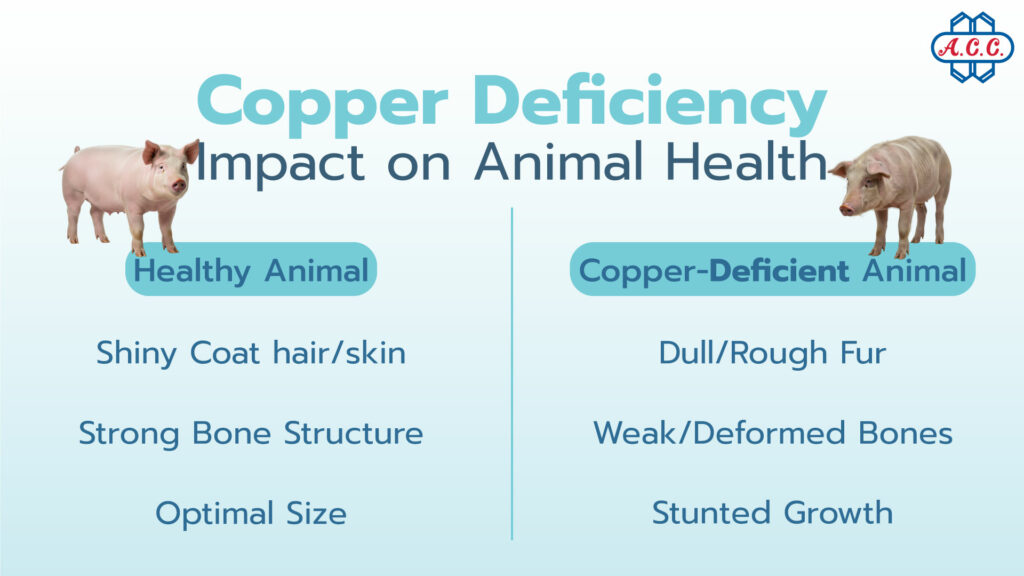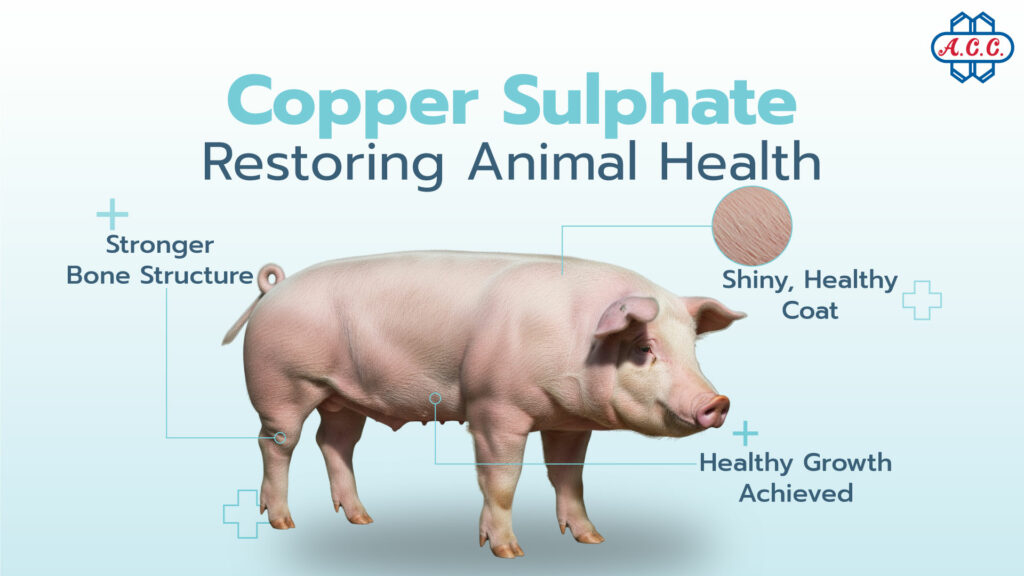
31 Jul Copper Deficiency in Animals: Hidden Signs You Might Be Overlooking, and How to Solve It with Copper Sulphate
In the world of commercial livestock farming, whether it’s poultry farms, pig farms, or large-scale livestock operations, the ultimate goal is to raise healthy animals that grow to their full potential and yield valuable production. Comprehensive nutritional care is therefore a crucial aspect that all entrepreneurs should not overlook. Although primary nutrients like protein and energy receive special attention, some trace minerals play an unexpectedly vital role. Among these is copper, an essential mineral for countless biological processes. If animals are copper deficient, chronic health problems can arise, severely impacting production. However, often these signs are overlooked. This article will delve into the hidden signs of copper deficiency in poultry and livestock, while also highlighting the significant role of Copper Sulphate in resolving these issues and restoring good health to your farm.
Is Your Livestock Facing Copper Deficiency?
Copper deficiency in animals does not only occur from insufficient copper intake in their feed but can also arise from other more complex factors, such as excessive amounts of certain minerals in the diet (e.g., molybdenum or zinc), which can inhibit the absorption and utilization of copper in the animal’s body. Understanding these causes will help us solve the problem precisely.
Copper (Cu) is a crucial component of over 30 enzymes and proteins in the animal body, playing a significant role in metabolism, red blood cell formation, nervous system function, bone and connective tissue formation, and most importantly, the immune system. If the animal’s body lacks copper, these enzymes cannot function optimally, inevitably affecting the animal’s overall health.
Hidden Signs You Might Never Have Noticed!
Most farmers are aware of obvious symptoms of copper deficiency, such as stunted growth or faded coat/feathers. However, there are actually many other ‘hidden signs’ that can indicate copper deficiency in animals before severe symptoms occur, which can make diagnosis and problem-solving difficult. If we do not understand these mechanisms, we might overlook the real underlying issue.
-
Abnormal Hair/Feather Anomalies Unrelated to Parasites
- In livestock, especially cattle or horses, a hidden sign is abnormal or faded hair color (Achromotrichia). This is particularly noticeable in dark-haired animals, such as Angus cattle with black coats, where the tips of their hair may appear reddish-brown or “rusty coat.” This is due to copper’s important role in the Tyrosinase enzyme, which is involved in melanin synthesis.
- In poultry, it might be observed that feathers appear rough, dull, or discolored, even if the animals have received good hygiene care.
-
Bone and Joint Abnormalities Beyond Just “Weak Legs”
- Beyond merely weak legs or easily fractured bones, a hidden sign is Chondrodysplasia, or incomplete bone formation at a microscopic level. This might not show severe symptoms initially but will cause animals to have difficulty moving or become more susceptible to illness later in life. Copper is an essential cofactor for the enzyme Lysyl Oxidase, which plays a crucial role in cross-linking collagen and elastin. If copper is deficient, the structure of bones and connective tissues will weaken.
-
“Unprofitable” Growth Problems
- It’s not just slower-than-normal growth, but also reduced feed efficiency. Animals consume the same amount of feed but fail to convert it into body weight or production as they should. Copper plays a role in various enzymes involved in energy metabolism and nutrient absorption. If these processes are incomplete, animals will waste feed unnecessarily.
-
Weakened Immune System with “Unknown Cause”
- Animals frequently get sick, suffer from recurrent infections, or respond inadequately to vaccinations. Copper is crucial for the function of several immune cells, including being a component of the Superoxide Dismutase (SOD) enzyme, which is a vital antioxidant. Copper deficiency impairs the function of these cells, leading to a weakened immune system without specific disease symptoms.
-
Complex Reproductive Issues
- In breeding animals, there might be difficulties with conception rates, low fertilization rates, or problems maintaining pregnancy. Copper is involved in the production of certain hormones that regulate the reproductive system, as well as the development of eggs and sperm. These signs might be misinterpreted as other issues, delaying appropriate treatment.

Copper Sulphate: A Precise Solution for Addressing Copper Deficiency
Once we are aware of these hidden signs, resolving the problem with proper copper supplementation becomes absolutely necessary. Copper Sulphate is one of the most widely recognized and used copper sources in the livestock industry, owing to its important properties:
-
Cost-Effective and Efficient Copper Source:
Copper Sulphate is a highly concentrated source of copper with good bioavailability at an accessible price, making it an economical and effective option for supplementing copper in animals.
-
Absorption and Utilization:
When animals receive Copper Sulphate, their bodies can quickly and efficiently absorb copper ions for various biological processes, helping to restore the function of copper-related enzymes.
-
Correcting Copper Deficiency Symptoms:
Supplementing Copper Sulphate in appropriate amounts can help alleviate and correct hidden copper deficiency symptoms, such as improving coat quality, strengthening bones, enhancing growth performance, and boosting the animal’s immune system.

Appropriate Dosage: The Key to Success with Copper Sulphate
Using Copper Sulphate to correct copper deficiency requires careful consideration of the appropriate dosage for each animal species, age group, and specific farming conditions. Providing too little Copper Sulphate might not yield results, while giving too much can lead to copper toxicity, which is harmful to animals.
Farmers should consult animal nutritionists or expert veterinarians to determine the most precise Copper Sulphate dosage for their farm, based on:
-
Animal Nutritional Requirements:
These vary by breed, age, and production level. [Reference: NRC (National Research Council). (2000). Nutrient Requirements of Beef Cattle. 7th Rev. ed. Washington, D.C.: National Academy Press.]
-
Composition of Current Feed:
It is necessary to check the existing copper content in raw feed materials.
-
Environmental Conditions and Complementary Factors:
Such as the amount of molybdenum or sulfur in water or soil, which can affect copper absorption.
The wise and scientifically correct use of Copper Sulphate will ensure that your animals receive maximum benefits and that copper deficiency problems can be effectively resolved, leading to increased production and the sustainability of your farm.
Conclusion:
Don’t Overlook Hidden Signs for Perfect Health, Copper deficiency in animals is a complex problem that can manifest with easily overlooked hidden signs. Understanding the crucial role of copper in all bodily processes, along with meticulously observing abnormal signs, is the first step towards sustainable problem-solving. The proper and appropriate use of quality Copper Sulphate is an effective solution for enhancing health, restoring growth, and boosting the immune system of poultry and livestock back to full health. Investing in the right Copper Sulphate is therefore a worthwhile investment for the sustainable future of your farm.
Ensure Consistent Production with International Quality Copper Sulphate from Asian Chemical Co., Ltd.!
Asian Chemical Co., Ltd. (ACC) is a leader in the production and distribution of industrial chemicals in Thailand. We are well aware of the importance of high-quality minerals for health and productivity in the livestock industry. Therefore, we are committed to producing excellent quality Copper Sulphate, which is part of our animal feed mineral group, undergoing stringent quality control processes at every step. This ensures that your animals receive safe and highly effective copper supplementation for health and growth.
Our Copper Sulphate products not only meet animal nutritional needs but are also certified with numerous world-class international standards, including ISO9001, ISO14001, ISO45001, ISO/IEC 17025, FAMI QS, HACCP, and GMP. These certifications are a testament to our commitment to delivering the best products and services to leading customers both domestically and internationally, with sustainable social and environmental responsibility.
Choose Copper Sulphate from ACC for healthy animals and sustainable farm production!
📞 Tel: +66 (38) 570 150-2 Ext. 106, 107 or +66 (81) 8337 043
📩 E-mail: [email protected]
🌐 Website: https://acc1976.com/th/
🏢 Asian Chemical Co., Ltd.
85/1 Moo 5, Wellgrow Industrial Estate, Bangna-Trad Rd. Km.36, Bang Samak, Bang Pakong, Chachoengsao 24130 Thailand



No Comments